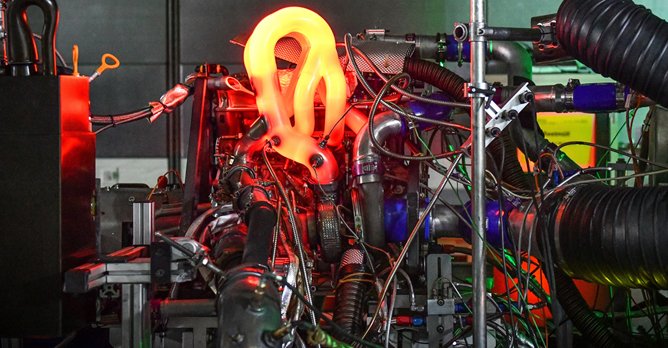The new Audi turbo engine for the DTM
22 Mar 2019|776 views
The 2.0-litre four-cylinder powerplant of the Audi RS5 DTM delivers more than 610bhp. By means of the 'push-to-pass' function, the drivers can even access a short-term 30bhp power boost.
The new Class 1 Regulations of the DTM are geared to utmost efficiency. Just like in production, the challenge is to extract the maximum from the available fuel through high compression and very good efficiency. In the DTM, the amount of fuel is limited to 95kg per hour.
"That may sound like a lot but, in view of more than 610bhp, it really isn't," says Ulrich Baretzky, Head of Engine Development at Audi Motorsport.
"The specific consumption of the DTM engine is extremely low and now within ranges that used to be typical for diesel engines. In terms of weight and lightweight design - especially in the context of avoiding CO2 emissions - we're pointing out a few approaches that will hopefully find their way into future road-going vehicles - like in the case of the first TFSI for Le Mans and the TDI."
The compact four-cylinder turbo engine with gasoline direct injection (TFSI) only weighs 85kg and thus only half as much as the naturally aspirated V8 engine that was previously used in the DTM. As a result, the dry weight of the Audi RS5 DTM has dropped to less than 1,000kg. The power-to-weight ratio is now about 1.6kg per bhp.
The 2.0-litre four-cylinder powerplant of the Audi RS5 DTM delivers more than 610bhp. By means of the 'push-to-pass' function, the drivers can even access a short-term 30bhp power boost.
The new Class 1 Regulations of the DTM are geared to utmost efficiency. Just like in production, the challenge is to extract the maximum from the available fuel through high compression and very good efficiency. In the DTM, the amount of fuel is limited to 95kg per hour.
"That may sound like a lot but, in view of more than 610bhp, it really isn't," says Ulrich Baretzky, Head of Engine Development at Audi Motorsport.
"The specific consumption of the DTM engine is extremely low and now within ranges that used to be typical for diesel engines. In terms of weight and lightweight design - especially in the context of avoiding CO2 emissions - we're pointing out a few approaches that will hopefully find their way into future road-going vehicles - like in the case of the first TFSI for Le Mans and the TDI."
The compact four-cylinder turbo engine with gasoline direct injection (TFSI) only weighs 85kg and thus only half as much as the naturally aspirated V8 engine that was previously used in the DTM. As a result, the dry weight of the Audi RS5 DTM has dropped to less than 1,000kg. The power-to-weight ratio is now about 1.6kg per bhp.
Latest COE Prices
July 2025 | 2nd BIDDING
NEXT TENDER: 06 Aug 2025
CAT A$101,102
CAT B$119,101
CAT C$68,600
CAT E$120,000
View Full Results Thank You For Your Subscription.























